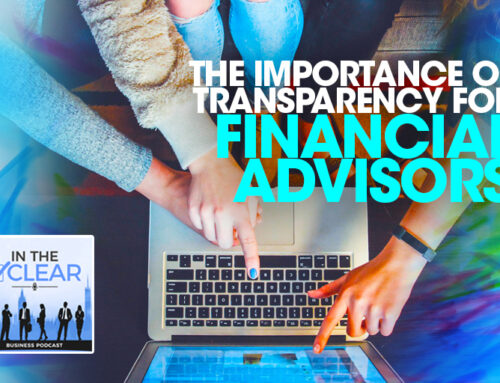
Tony Sanders, an author, coach, CEO and minister, joins Justin Recla to bring his insights about entrepreneurship and fatherhood. He leads the charge in providing services, programs, resources, training and coaching in personal and professional development. Through his consulting business, Tony equips, empowers and encourages people to be the best version of themselves. He’s on a mission to help enlighten and empower fathers across the globe. Listen as he shares his thoughts and deep understanding in entrepreneurship and fatherhood.
Welcome to the In the Clear podcast. I am your host, Justin Recla, and today, we’re going to switch things up a little bit. Today, we’re going to get down into the nitty-gritty, some of the details of the business. Our guest today is Tony Sanders. Tony is … he’s really … he’s out on a mission to change the way things are done from the family perspective. His talking points are all in the power of the father’s voice, the power of fatherhood, the power that fathers play in family and business and life in general, and so I’m really super excited to have Tony on the show today, because he brings a different insight that I believe today is often overlooked when you break things down to the family level. So Tony, welcome to the show.
Thank you, Justin. I appreciate it.
So Tony, tell our listeners a little bit about who you are and what you’re doing.
Absolutely. I’ll be happy to. Justin, I am an author. Also, I am a coach and consultant, and I am privileged to own a couple of businesses, small business that I use to not only meet needs and provide services for our community but also to provide employment opportunities and training opportunities for those who might be considered marginalized or disenfranchised. So I’ve got my hands in several different pots. I happen to also be a pastor of a church and … man, just doing a whole lot.
And I know one of the books that you’ve written is called Daddy Talks. It’s empowering fathers, encouraging children, and equipping families. Talk to me a little bit more about your mission to help empower fathers around the globe.
Absolutely. One of the organizations that I’m privileged to give leadership too is an organization by the name of Family First, A Call to Action. And part of the mission of Family First is to repair families and restore families, and what I’ve noticed in working with so many different families … and of course, the statistics prove and bear witness that there is an epidemic when it comes to fatherlessness. So one of the ways and/or one of the objectives of helping to restore that family is helping to repair relationship with fathers to help fathers get re-engaged in the lives of their children, and so I’m working on books, of course, and resources and training, parenting classes, curriculum … you name it. Whatever we can do to come alongside that father and empower them and encourage them, we’re doing just that.
I absolutely love it. I think you’re spot on. I think one of the things that we’ve seen over the last 10, 15, 20 years is kind of a … as a whole and as a society, we’ve gotten into this mechanical way of being that parents leave the house and go to work 9 to 5 and come home. And we see our kids from 6 o’clock to 8 o’clock at night and maybe on the weekends and all those kinds of things. And so it’s really … And then you throw in the mix of things like the internet and all sorts of kinds of the things that allow us to disconnect.
And then, of course, there’s the whole conversation around, like you said, fathers being absent from their kids’ lives. That’s had a huge impact on society over the last 10 to 15 years, and I’m going to be just straight transparent here, is that I come from … My first marriage ended up in divorce, and I got divorced when my kids were 6 years old and 8 years old, and I went away. I went to Iraq for a year. I took a job overseas in Iraq because it’s the only place I could find work in the counterintelligence field. And so I know what that feels like, to be a father that wasn’t able to be there all the time because of the work situation. How do you help fathers manage those issues that come up for them?
Well, there is a general approach that is a little bit more applicable and/or universal too, perhaps, any situation. But I would say 90% of the time, it’s tailored. Every family’s situation and dynamics is a bit different, so there’s a simple way of answering that question. But to be fair, most families, there’s that tailoring and that personal relationship where we learn the nuances of what’s going on and help them to address their issues in a very practical way. But anyway-
Yeah, what you just said, that just gave me chills. It literally just gave me chills, because I have to agree. I don’t think there is … I don’t think there can be a cookie cutter solution to those types of issues that come up.
Yes, sir. Yeah, I mean, like I said, there are some universal principles and practical things that can be done to help families, but for the most part, since we are all unique … I mean, every 7 billion people on the face of this earth, and we all have very unique and distinctive fingerprints. And I just use that analogy, and I respect that analogy. Every family, every household has its own unique fingerprint, if you will. And so learning that family and the dynamics and the nuances of that family … the approach would be different in each situation.
But in a universal sense, I would say some of the basic things is helping the father to understand that fatherhood both is a responsibility, and not only is it a responsibility, it is something that is expected. They don’t have a choice. Just because they and the mother of a child are no longer together does not make them exempt from being involved and engaged in the life of that child. It’s a responsibility.
Absolutely.
And it’s a right.
Yeah, I absolutely love that. Yeah, I’ve been blessed to have a really neat relationship with both of my older children, and my oldest now is 21 and my oldest daughter is 17. And I’ve been able to build a really, really neat relationship with them over the last decade or so, ever since their mom and I separated. And it is such a … We’re seeing more and more of the topics, and especially the ones that you focus on, in the news of the empowering the father to take full responsibility for how they show up in their kids’ lives moving forward.
And I’ve talked to a lot of different people that talk to … that takes the position that fathers are typically the ones that are left in the dark when it comes to divorce situations. How do you address those kinds of situations when you come up with a client or the situation to where the father feels like they were left behind or left in the dark? How do you assist those kinds of situations?
Well, again, in learning the dynamics of the family and understanding why the father was not there in the first place is very important, because it gives us an opportunity to sit down and talk through those things. I think a lot of the coaching that takes place in coaching the father to get back involved in the life of that family requires some family consulting. And so, in sitting down and understanding … having a clear overview of what are the issues? Why was not the father there in the first place? And working through those things.
Sometimes, it requires the consulting angle to focus on forgiveness, whether it’s the father forgiving someone in the household or someone in the household forgiving the father. Sometimes, it requires us to deal with hard and painful topics whereby you may find a situation that occurred in the household that was damaging and destructive. So it’s, once again, just kind of working through those different dynamics.
I love, love that approach to understanding … well, the big thing that you touched on there for me was the forgiveness piece. That was something that I worked through myself when I was going through the divorce situation and being in Iraq and just the amount of guilt and stuff that brought for me as a father. And that forgiveness piece, not of only self, but of the situation and of the circumstances and all those things, I think it is so, so important to our personal growth as men, our personal growth as fathers, and to be able to play that for our children and showing that, how they can integrate that forgiveness piece for themselves, as well.
Yes, sir. Indeed. And when you have situations where there is divorce, depending on how that … the separation of the family occurred and took place, there can be a lot of damage there, a lot of repairs, a lot of healing. And sometimes, the children take ownership, or they take on the brunt of and/or the responsibility. They think sometimes it’s their fault. Daddy left because of me, or Mommy left because of me, or because I wasn’t a good kid or whatever. Sometimes, they own that, and it just causes a great deal of repair because of the destruction and the damage that has been caused by divorce.
Yeah. Yeah, I absolutely agree. If you’re just joining us, we’re talking to Tony Sanders. Tony is an author, a coach, and a minister who’s on a mission to help enlighten and empower fathers across the globe. Tony, where can our listeners go to find out more about you?
They can go to our website, daddytalks.org. Also, you can find me on Facebook. The social media handle that I use revyrev402. So you can find me there on Facebook. Daddy Talks has a Facebook presence. I’m also on social media on Twitter, Instagram, and Snapchat under revyrev402. So quite a few places.
Fantastic. Again, we’re talking to Tony Sanders with Daddy Talks. This is the In the Clear podcast, and when we get back, we’re going to talk to Tony a little bit further about some of the tips that he has for fathers out there and what that looks like to really step into a role of empowerment as a father. So stay tuned.
All right.
To listen to the entire show click on the player above or go to the In the Clear podcast on iTunes.
Podcast: Play in new window | Download



